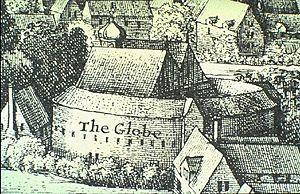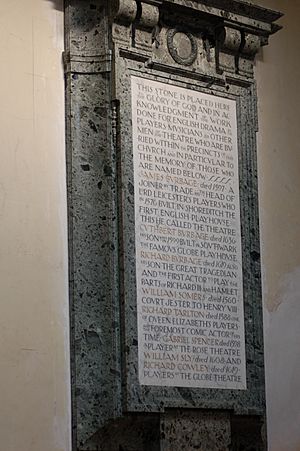Lord Chamberlain's Men facts for kids
The Lord Chamberlain's Men was a famous acting group, or "playing company," in England. The great writer William Shakespeare wrote most of his plays for this company. The main actor, Richard Burbage, played many famous roles, including Hamlet, Othello, King Lear, and Macbeth. The group formed in 1594 and quickly became one of the top two acting companies in London. In 1603, they even got the support of King James I.
The company was created during the rule of Queen Elizabeth I of England. It was supported by Henry Carey, 1st Baron Hunsdon, who was the Lord Chamberlain. The Lord Chamberlain was the person in charge of all entertainment for the royal court. Because of his title, the group was named The Lord Chamberlain's Men.
After Henry Carey died in 1596, his son, George Carey, 2nd Baron Hunsdon, took over as the company's supporter. For a short time, the group was called Lord Hunsdon's Men. When George Carey also became the Lord Chamberlain in 1597, the name went back to The Lord Chamberlain's Men. Later, in 1603, when King James I came to the throne, he became the company's new supporter. The group changed its name to the King's Men. They were the only company allowed to perform Shakespeare's plays.
Contents
The Theaters They Used

When the company started in 1594, they performed at a playhouse called The Theatre. But after having problems with the landlord, they moved to the nearby Curtain Theatre in 1597.
The actors had a clever plan for their old theater. On a winter night in 1598, the Burbage brothers, a carpenter named Peter Street, and a few workers took The Theatre apart piece by piece. They carried the large wooden beams across the river to a new location in Southwark. There, they used the old wood to build a brand-new playhouse: the famous Globe Theatre.
The Globe Theatre opened in 1599. Sadly, it burned down in a fire in 1613. But it was rebuilt a year later and stayed open until 1642. Besides performing in London, the company also traveled and performed in other parts of Britain, and even in France and Belgium.
Today, a modern version of the Globe, called "Shakespeare's Globe", stands near the original spot. It opened in 1997 for people to visit and see plays just like in Shakespeare's time.
The People in the Company
The success of the Lord Chamberlain's Men was largely thanks to the Burbage family. James Burbage was the man who put the group together and managed it until he died in 1597. His sons, Richard and Cuthbert, were also members. Richard was the star actor, while Cuthbert helped run the business side.
The company was made up of different types of members:
- Sharers: These were the main members who owned a part of the company. They shared the profits but also had to pay any debts. There were usually about eight sharers.
- Hired Men: These actors were paid a wage to play smaller roles.
- Boy Players: In Shakespeare's time, women were not allowed to act on stage. Young boys played all the female roles. These boys were often apprentices, learning how to act from the older members.
Famous Members
- William Shakespeare: At first, Shakespeare was both an actor and a writer for the company. Over time, his writing became his most important contribution, but he continued to act in some plays.
- Richard Burbage: He was the lead actor and a huge star. He was the first to play many of Shakespeare's most famous characters, like Hamlet, Othello, and King Lear.
- William Kempe: He was the company's main comedian, or clown. He was famous for playing funny characters like Bottom in A Midsummer Night's Dream. Kempe was known for being very energetic and even danced from London to Norwich as a publicity stunt. He left the company around 1601.
- Robert Armin: After Kempe left, Robert Armin became the new lead clown. He was known for playing smarter, wittier characters, like Feste in Twelfth Night.
- Henry Condell and John Heminges: These two actors are very important to history. After Shakespeare died, they gathered all his plays and published them in a book called the First Folio in 1623. Without them, many of Shakespeare's plays might have been lost forever.
Plays and Performances
Most of the plays performed by the Lord Chamberlain's Men were written by Shakespeare. In their first few years, they performed plays like A Midsummer Night's Dream, Romeo and Juliet, and The Merchant of Venice.
The company became very popular and successful. They often performed for the royal court. In 1595, they performed for the queen four times, and six times the next year.
They also performed plays by other writers. For example, they staged plays by Ben Jonson, another famous playwright of the time.
Around 1599, the company opened the Globe Theatre with some of Shakespeare's new history plays, like Henry V. Soon after, they likely performed Hamlet for the first time. The company's work was so popular that it helped shape English theater for many years to come.
The Audience Experience
Going to the theater was a very popular activity in London. The city had about 200,000 people, and it's estimated that over 15,000 of them went to see plays every week. Theaters were often located in busy, noisy parts of the city.
The Lord Chamberlain's Men became one of the most popular acting groups, which meant they had to work very hard. To keep the audience entertained, they had to perform up to six different plays every week. This was a big challenge for the actors, who had to memorize lines for many different shows with very little time to rehearse.
As the company grew, they performed in bigger and better theaters.
- The Globe Theatre was an outdoor theater that could hold up to 3,000 people. The cheapest ticket was just a penny, which allowed people from all walks of life to attend.
- The Blackfriars Theatre was a smaller, indoor theater they started using in 1609. It could only hold about 600 people, and tickets were much more expensive. The cheapest ticket was sixpence, six times more than at the Globe.
Having both an outdoor and an indoor theater meant the company could perform all year round and make more money.
 | William L. Dawson |
 | W. E. B. Du Bois |
 | Harry Belafonte |


